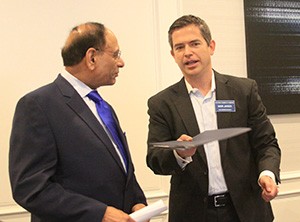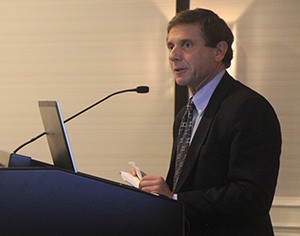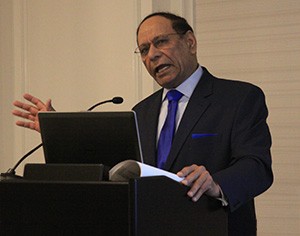
The importance of trade agreements and their impact on U.S. jobs was the focus of a recent international breakfast hosted by the California Chamber of Commerce.
Nearly 40 CalChamber Board members attended the December 5 breakfast to hear Ambassador Islam Siddiqui, senior advisor, global food security at the Center for Strategic and International Studies, and Brian Peck, deputy director of international affairs at the Governor’s Office of Business and Economic Development (GO-Biz).
CalChamber Board member Mark Jansen, chair of the CalChamber Council for International Trade and president and CEO of Blue Diamond Growers, served as the master of ceremonies at the breakfast.
He thanked Susan Corrales-Diaz, president and CEO of Systems Integrated and 2015 CalChamber second vice chair, for serving as the previous council chair since the beginning of the century.

Brian Peck opened with a brief update on current GO-Biz activities, and once again thanked the CalChamber for its support and organization of the July 2014 Gubernatorial Trade Mission to Mexico.
Trade Supports U.S. Jobs
Ambassador Siddiqui then discussed the importance of exports and trade facilitation for the U.S. economy.
With more than 95% of the population living outside the United States, exporting provides a massive opportunity for U.S. farmers, ranchers, manufacturers and service providers.

The Ambassador noted that “every $1 billion in U.S. exports in goods support about 5,000 jobs and exports of agricultural products support 7,800 jobs throughout the U.S. economy.”
Trade Agreements
Siddiqui stressed the importance of trade agreements to help facilitate an increase in U.S. exports, which is critical to job retention and creation.
Trans-Pacific Partnership (TPP). The TPP, currently being negotiated between the U.S., Australia, Brunei, Chile Malaysia, New Zealand, Peru, Singapore, Vietnam, Canada, Mexico and Japan, would increase economic integration across the Asia Pacific, as well as expand exports and open new markets to the U.S.
The Ambassador noted that a successful agreement would lead to a higher participation in trade for small and medium businesses. Siddiqui mentioned that the issues TPP is addressing are: regulatory coherence, trade facilitation, food safety, technical barriers to trade, intellectual property rights, and sanitary and phytosanitary barriers to trade.
For more information, see www.calchamber.com/TPP.
Transatlantic Trade and Investment Partnership (T-TIP). The T-TIP would boost economic growth in the United States and Europe, and add to the more than 13 million U.S. and European jobs already supported by transatlantic trade and investment.
The U.S.-European Union economic relationship is already the world’s largest, accounting for one-third of total goods and services trade and nearly half of global economic output.
Siddiqui noted that while agriculture and the EU’s nontariff trade barriers are currently in the center of the discussions, the negotiations are focusing on elimination, reduction or prevention of barriers to trade in goods, services and investment. Successful negotiations will therefore promote international competitiveness, jobs, and growth in both the U.S. and the EU.
For more information, see www.calchamber.com/TTIP.
Trade Promotion Authority
Siddiqui concluded the trade discussion with a reminder that the success of TPP, T-TIP and all future trade agreements relies heavily on the renewal of trade promotion authority (TPA), granting the U.S. President the authority to negotiate agreements with other countries.
TPA is expected to be considered by Congress in 2015.
For more information, see www.calchamber.com/TPA.
Global Food Security
Siddiqui spent the last portion of the meeting describing his role as a senior advisor for the Global Food Security Project, providing research, analysis and policy recommendations to enhance global food security.
According to Siddiqui, the global food supply will need to more than double in 2050 in order to support the anticipated population of 9 billion.
The global food security project emphasizes agricultural research and development to increase agricultural productivity; engaging the private sector in agribusiness development opportunities; and creating favorable trade and investment climates to improve global access to food.
Staff Contact: Susanne Stirling

